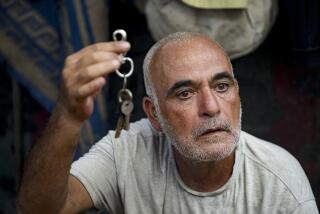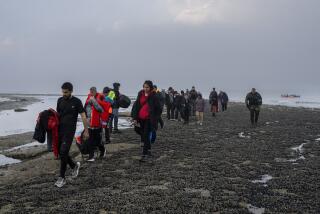Iraqis Go to Great Lengths to Get Away
- Share via
BAGHDAD — Americans may grumble about gas prices and long lines at the airport as they head out on summer vacation, but consider the holiday plans of Layla Mizhir and her 24-year-old son, Mohammed.
Over the weekend, the Mizhirs and another family arranged to pay $400 for the long, dangerous taxi ride across Iraq’s western desert to Jordan, on bleak roads frequented by insurgents and highway robbers. When they reached the border, they knew they stood a chance of spending as much as 24 blazing-hot hours waiting at the desolate crossing.
For the record:
12:00 a.m. July 14, 2006 For The Record
Los Angeles Times Friday July 14, 2006 Home Edition Main News Part A Page 2 National Desk 0 inches; 35 words Type of Material: Correction
Iraqi vacations: A July 3 article in Section A about Iraqis seeking relief from living in a war zone by going on vacation referred to a U.S.-imposed economic blockade. It was a United Nations-imposed blockade.
Of course, they could have flown, if any tickets had been available. And even going to the airport presents its own set of problems. The road from Baghdad is one of the most dangerous in the city, a frequent target of both roadside bombers and snipers. Once at the airport, travelers often have to endure long delays that can stretch into overnight stays.
But the payoff for reaching Jordan would be a slice of heaven. The Mizhirs planned to treat themselves to the luxury of first-run movies, leisurely coffees at sidewalk cafes and visits to the mall. Most important, they would get a two-week breather from Iraq, which has deteriorated all the more in the last several months.
So what happened along the way? More on that in a moment.
For some Iraqis, this is the first time in years that a vacation has even been possible, given the decades of turmoil in their homeland. With three wars, a lengthy U.S.-imposed economic blockade and a dictator who prevented his people from leaving the country, vacations abroad were long a luxury for only a chosen few.
Now they seem an absolute necessity for those who can afford it, a small minority of Iraq’s population, given the anarchy and random killings that permeate Baghdad and other Iraqi cities. Even the perks that used to make life bearable for the middle class are now largely inaccessible, either because of the perils of getting to them or because they no longer exist.
The restaurants that once attracted a loyal followings are shuttered because people are afraid bombs will be detonated while they sit at their tables. And a strict curfew keeps people off the streets here for almost all of the evening hours.
“We were members of clubs,” said Mizhir, 55, a pharmacist whose family rarely ventures from home because the streets of Baghdad have become so dangerous. “We would go to the swimming pool and also do our exercises there. But we left it. It was the only way to have fun and we left it. Our life now is only at home.”
Mizhir and her son are among the many bent on leaving the country, hoping against the odds that conditions improve by the time they return. That includes not only safety, but such essentials as electricity to run air conditioners and gasoline to fill their tanks.
There are more flights out of Iraq these days, though most are booked solid. Iraqi Airlines announced Wednesday that no more economy-class reservations would be taken for the next month and that first-class seats were filled for the next 10 days.
Safaa Ketani, a manager at Ishtar Travel Agency in Baghdad, said his airline bookings were up 50% from last year, largely because driving to Jordan or Syria had become so perilous. The latest U.S. State Department travel warning for Iraq described vehicular travel as “extremely dangerous,” with numerous attacks on civilian vehicles and military convoys.
“They used to use cars to travel, but now they use planes, even though it’s very expensive,” Ketani said. “People are paying thousands of dollars just to leave Iraq. Seven or eight people from one family might use planes because it is safer.”
Safer, perhaps, but still a major hassle, what with searches at a checkpoint in the sweltering heat before even reaching the airport, followed by a tiresome reloading of luggage into airport taxis for the last leg to the terminal. Then the norm is lengthy heel-cooling in the dreary waiting area before flights are called.
“People are willing to face half an hour or more of just being searched,” said Haj Mahdi Izbah, the manager of Baghdad’s Hijas Travel Agency. “And they are willing to spend hours in the airport rather than take the highway.”
Or, as Ketani put it: “At least they know they are going someplace. They know they will no longer have to tolerate the situation here.”
But even if they can leave the country, Iraqi vacationers are limited in the places they can go. Besides Syria and Jordan, the major destinations are Egypt, Iran and Lebanon. After that, the pickings are slim for Iraqis, who are largely unwelcome in many countries because of fears they will stay too long. Even in Jordan, new regulations were imposed recently that cut visits to two weeks, with a surcharge for each extra day in excess of that.
Dalia Lami, a Baghdad resident who fled to Amman, Jordan, a year ago after her brother was killed, said she has watched as the Jordanian capital has absorbed more and more Iraqis.
She said apartment rents in Jordan had doubled in the last year because of the influx of Iraqis, both vacationers and those on extended stays. She said Iraqis arriving in Jordan often go on spending sprees, buying items not available in Iraq.
“At the malls, you only hear Iraqi accents, not Jordanian, because they are the ones who are spending their money,” she said in a telephone interview. “In Iraq, you can’t spend money. If you spend too much money you stand out in the crowd and risk kidnapping.”
Faak Ahmed, a 36-year-old Baghdad photographer, took his family to Syria last month, setting them up in a much smaller apartment in Damascus, the capital, than the one they left in Iraq. He said he relished the new freedom of going and coming whenever he wanted. But mostly, he said, he wanted to leave Baghdad because his wife, Hind, is pregnant with their first child.
“If my wife goes into labor, at least I can take her to the hospital at a late hour when she is giving birth,” he said in a telephone interview. “There are a lot of women in Baghdad who went into labor in the late hours and they were killed on the way to the hospital. I don’t want to be put in that situation.”
Ahmed plans to stay in Damascus for the summer, so that his wife can have the baby while they watch for any signs that the security situation in Iraq is beginning to stabilize.
“I’m not asking for a big change, just a change,” he said.
Lami, like so many other Iraqis, chafes at the treatment her countrymen endure when they travel abroad, even to relatively poor, developing nations such as Egypt. It is especially galling, she said, to be looked down on when Iraq was once known as one of the best-educated countries in the Middle East.
“Iraqis are hardly accepted anywhere,” she said. “It’s hard to be seen as untrustworthy and backward because we haven’t had access to the rest of the world in the last 30 years.”
As for Layla Mizhir and her son, the two left for Jordan at 6 a.m. Saturday and reached the border at midday. But Jordanian officials picked out Mohammed, along with a number of other young men, and told them they could not cross that day. No official reason was given.
Mizhir was unwilling to cross without her son, so the two paid another $100 for the return ride to Baghdad. Along the way, they were searched at numerous checkpoints, including one that forced them to endure two hours in the afternoon desert sun.
When they finally reached Baghdad, it was well past the 8:30 p.m. curfew and they were forced to stay the night at the taxi headquarters.
“It was a very bad day for us,” Mizhir said Sunday.
More to Read
Sign up for Essential California
The most important California stories and recommendations in your inbox every morning.
You may occasionally receive promotional content from the Los Angeles Times.













